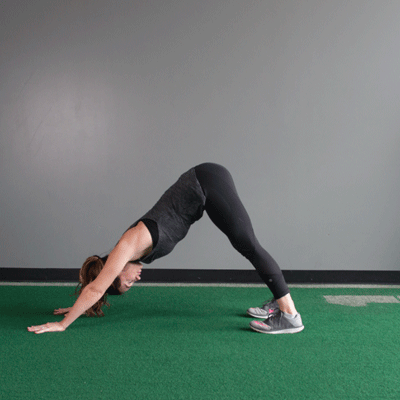
Yoga is a wonderful way to improve your flexibility. Yoga can help with stiffness and joint pain. It is common for new practitioners to feel restricted in hip flexibility and hamstring flexibility. This can lead to poor posture, straining the knee joint, and worsening of your posture. It also decreases levels dopamine or serotonin which are neurotransmitters known to improve mood and reduce anxiety.
One study shows that yoga can reduce the pain of chronic low back problems. This condition is one of the most common forms of back pain in veterans. It can severely impact a person's ability to live a normal life. The participants in this study reported lower intensity and disability scores after a 12-week yoga program. Their use of opioids decreased, which is great news for chronic low-back pain sufferers. Yoga practice has many benefits, which have been well documented.
Many yoga moves can help you reduce stress. These yoga exercises can improve your overall health, as well as increasing lymph flow. As you practice, your lymph drainage will be increased, which is a critical part of the human body. The lymphatic system is responsible to prevent infection, kill cancer cells, and dispose of harmful waste products. Regular practice of yoga can make you feel less stressed, which can be a good thing for your sleep.

Stress can worsen constipation. Yoga can help. It also decreases suffering, which can be a huge benefit. This is why stress is often a contributing factor to bowel issues. Yoga can help reduce constipation. You can train your mind to be present by improving your ability concentrate, learn, retain and share information.
Yoga can also improve your heart health, according to studies. It has been found that it can increase the amount of hemoglobin in the blood, which is the protein that carries oxygen to the tissues. Another benefit of yoga is its ability to increase hemoglobin. It can help improve your heart health as well as reduce the risk of strokes and cardiovascular disease. It has been shown in studies to improve the flexibility and muscle strength of the hands and feet. It can also improve balance which is important in a number of ways.
The benefits of yoga extend to the spinal discs. The discs between the vertebrae play a crucial role in preventing nerve compression and herniated disks. These discs must be mobile to ensure that the spinal disks get the nutrients they require. Therefore, it's essential to practice a variety of yoga poses to maintain your spinal health. It is possible to improve the flexibility of your muscles by performing asanas in this pose.
The benefits of yoga are well-known. It can reduce anxiety and depression. In a 2015 study, researchers discovered that yoga-practicing participants had lower stress levels. They also had better cardiovascular function. This makes them less susceptible to heart disease. Although it is a small advantage, this is the most significant. It helps them feel better about their bodies and themselves.

Yoga improves the heart, just like any other form of exercise. This is due to the fact that it helps pump blood throughout your body. It is responsible for improving the health of the heart. This reduces the chance of developing heart disease. Yoga can improve your cardiovascular fitness and help you to reduce the risk of developing heart diseases. There is also no reason why you shouldn't try this exercise.
Yoga can help improve physical health and decrease the symptoms of heart disease. It slows the progression cardiovascular diseases by reducing levels of cholesterol and other inflammatory compounds. It can reverse DNA mutations and lower cortisol levels. It is known to prevent heart attacks, migraines and osteoporosis. It is great for your mental well-being, helping you to cope with stress and improving your concentration.
FAQ
What is butter good for?
Butter is one source of saturated fats. This type is beneficial for healthy skin and hair as well as stronger bones.
Vitamin K, found in butter is an antioxidant that prevents bleeding from cuts. Vitamin K works together with vitamin C to prevent bruising.
Butter is also rich with minerals, such as calcium and phosphorous. These elements promote stronger bones and teeth.
Butter has its limitations. Butter contains high amounts of cholesterol. A few studies have shown that too much cholesterol can increase the risk of developing coronary disease.
Butter also contains high amounts of saturated fat, which contributes to obesity and increases cholesterol.
If you have to have butter, spread it on bread instead of dipping it in soup or salad. Bread absorbs less oil than pasta and potatoes.
How many calories per day should I consume?
This varies from person to person. The average is 2000 - 2500 calories per day. It's important to assess your life style, gender, age and height in order to determine how much calories you need.
Can I go to a gym 7 days per week?
Yes, you can go to a gym seven days per week. But not all at once. You need to find a time that you are able to do this without feeling exhausted or drained.
This will keep you motivated and provide energy for other activities.
You also need to ensure that you eat well enough during these times. This will help you not feel tired or slow at the gym.
Last, you must make sure that there isn’t another thing competing for your attention. You might want to avoid working out on school nights if you have kids. They can distract you from your exercise routine.
Which dietary supplement is good for weight loss?
Weight loss requires diet and exercise. Some people find that supplements can help them along the journey.
Some studies suggest that omega-3 fatty acids may help with weight loss. Omega-3 fatty acid is an essential fat that is important for brain function as well as cell membrane integrity. They can be found in seafoods like salmon, tuna or shrimp, as well as cod liver oil.
Other research suggests that green tea might be beneficial for weight loss. Green tea contains catechins, antioxidants that may help boost metabolic rate and encourage weight loss.
Statistics
- By John Thompson Take a whopping 38% off a set of PowerBlock Pros. (menshealth.com)
- Cardmembers earn 5% Back at Amazon.com with a Prime Credit Card. (amazon.com)
- An estimated calorie range for moderately active adult males falls between 2,200 to 2,800 calories per day, depending on age. (eatright.org)
- According to the American Academy of Dermatology (AAD), men over 50 are at a heightened risk of developing it. (healthline.com)
- Are You One of the 20% of Guys (mh.co.za)
External Links
How To
What nutrients does a man require daily?
For healthy growth and development, men need to eat a balanced diet. The body needs vitamins, minerals as well as proteins, carbohydrates and fats.
You also need specific nutrients for different times in the day. For example, when you sleep, your body uses energy from food to make hormones, antibodies, and enzymes. When you wake up, your body uses protein to repair damaged tissue and build muscles.
At night, your body breaks down fat and stores the extra energy as glycogen. Your body has less energy but still requires enough nutrients during this time. If you feel hungry, you can have a snack in the evening.
For your body to function properly, it needs adequate amounts of protein and carbs. If you train hard, you may experience muscle soreness after exercising.
To prevent this from happening, you need to consume carbs or protein within two hours. Your body will breakdown stored glycogen and provide you with glucose for energy.
In addition, you must consume protein immediately after completing your workouts. This prevents muscle tissue from being broken down while you are sleeping.
Your body makes lactic acid when you are doing intense physical activities. It builds up in your bloodstream, which can lead to fatigue. To avoid this, you should eat foods rich in carbohydrates, such as fruits and vegetables.
Carbohydrates give your body the energy it needs to recover from strenuous exercise.
In addition, you may want to include lean meats, fish, eggs, milk, cheese, yogurt, beans, nuts, and seeds into your diet.
All these foods are high-quality sources of protein. Protein promotes muscle growth and repairs damaged tissues. It provides amino acids that your body needs in order to produce sexhormones and testosterone.
Good skin, hair, and joint health requires adequate dietary fats. Healthy men should consume between 20% to 35% of their daily caloric intake from fat.
Fat helps protect your heart health and prevents cancer. It also keeps your brain functioning properly.
Vegetable oils, such as olive oil, sunflower oil or corn oil, soybean oil and peanut oil, can supply most of the fats you require.
These oils contain high levels of monounsaturated fat acids (MUFAs). MUFAs lower cholesterol and decrease inflammation. They protect your cells against free radical damage.
Saturated oils (SFAs), found primarily in animal products such meats, dairy products and butter, are known to raise LDL ("bad") cholesterol. SFAs increase LDL ("bad") cholesterol, and increase triglycerides. They promote weight gain and abdominal fat.
Polyunsaturated oils (PUFAs), are found in plant-based foods like nuts, seeds and vegetable oils. PUFAs can improve cardiovascular function and reduce inflammation. They also reduce blood sugar, cholesterol, and other inflammatory factors.
Low HDL ("good") cholesterol is a common cause of erectile dysfunction in men. High consumption of saturated fats increases bad cholesterol, which lowers the level of good cholesterol.
Men who eat large quantities of red meats or pork may develop prostate problems. When heated, nitrates are converted to nitrosamines. These compounds can cause cancer.
Most processed meats have nitrites and harmful chemicals. Avoid them.
The American Heart Association recommends that you limit your intake of red meat to 2 per week. Choose poultry, fish and legumes instead.